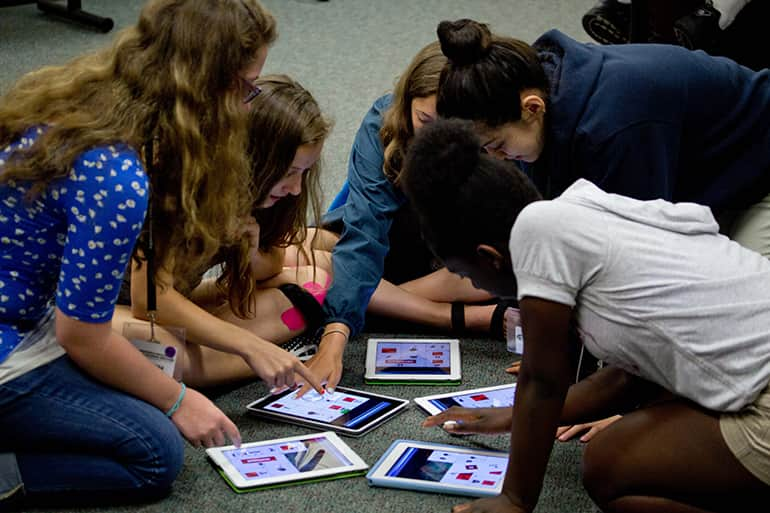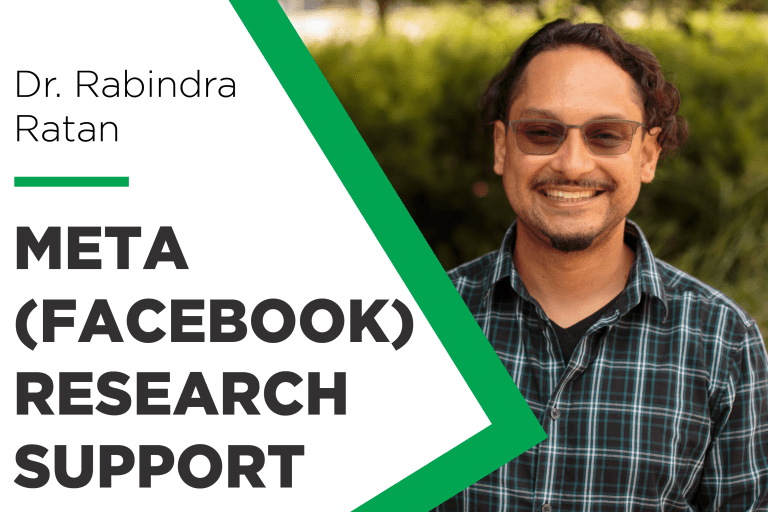Rabindra Ratan Ph.D.

Bio
Rabindra (Robby) Ratan (CV) is Professor and AT&T Endowed Chair at Michigan State University’s Department of Media and Information as well as Director of the Social and Psychological Approaches to Research on Technology-Interaction Effects (SPARTIE) Lab. He is also an affiliated faculty member of the MSU Department of Psychology, the MSU College of Education’s program in Educational Psychology and Educational Technology, and the MSU Center for Gender in a Global Context. He received his Ph.D. from USC’s Annenberg School for Communication and Journalism, his M.A. in Communication from Stanford University, and his B.A. in Science, Technology and Society, also from Stanford University.
Dr. Ratan conducts social and psychological research on the effects of human-technology interaction, focusing on how media technologies (e.g., XR/VR/AR/MR, avatars, video games, agents/AI) influence meaningful outcomes (e.g., equity, well-being, motivation) across societal contexts (e.g., education, health, industry). He is particularly interested in the Proteus effect (i.e., avatar characteristics influencing user behaviors), human-AI interaction, gender stereotypes in gaming, and virtual meetings. In addition to conducting research on these phenomena, he has also been teaching all of his MSU classes in virtual reality since 2022.
Dr. Ratan has authored over 80 peer-reviewed articles in publication venues such as Media Psychology, the Journal of Computer-Mediated Communication, Communication Research, Computers in Human Behavior, Games and Culture, New Media & Society, Computers & Education, the International Journal of Communication, and SIGCHI. He has received grant funding from the National Science Foundation, the Superior Health Foundation, non-profit organizations, and technology companies, such as Spin Mobility (Ford Motor Company) and Techsmith, Inc.
Dr. Ratan regularly teaches his classes in virtual reality—students who do not own a VR headset borrow one for the semester from Dr. Ratan’s lab—and his students resoundingly prefer this method over traditional online teaching platforms. He has received multiple teaching awards, including the 2017 MSU Teacher-Scholar Award and the 2015 & 2023 MSU AT&T Instructional Technology Award, he was a 2014-2015 MSU Lilly Teaching Fellow, and he adopts an inclusive and non-traditional approach to teaching (e.g., academic raps, skateboard in class, teaching philosophy). He has held leadership roles in his field (e.g., the International Communication Association), helped organize global conferences (e.g., Meaningful Play), and served as peer-reviewer for over 60 academic journals and proceedings. His lab outreach/production team, SPARTIE-Lab Productions, produces a podcast and edutainment videos relating to the lab’s research. Dr. Ratan has also written opinion pieces for Wired Magazine and The Conversation, and his work has received international media coverage in news outlets such as National Public Radio, the Canadian Broadcasting Company, and the Washington Post.
Dr. Ratan is also founder of the Meaningful XR conference, the MSU XR Co-op, and the MSU Silicon Valley Field Experience.
For more info, please see his CV or Google Scholar pages.
Courses
MI101: Understanding Media (undergraduate)
MI299/MI401: Understanding Virtual Reality Experiences (undergraduate) -- Taught in Virtual Reality
MI401: Avatar Psychology (undergraduate) -- Taught in Virtual Reality
MI401: Understanding Future Media: Reflections in the Black Mirror (undergraduate)
MI960: Media & Technology (Ph.D.)
UGS200H: Video Game Impacts: Play with Meaning (honors undergraduate)
CAS 496: Hip-Hop, Communication & Society (undergraduate)
Roles
Professor and AT&T Endowed Chair
Dept. of Media & Information
College of Communication Arts & Sciences
Michigan State University
Director
Social and Psychological Approaches to Research on Technology-Interaction Effects (SPARTIE) Lab.
Affiliate Faculty
Department of Psychology
College of Social Sciences, MSU
Affiliate Faculty
Ed Psychology and Ed Technology Program
College of Education, MSU
Core Faculty
Center for Gender in Global Context
International Studies & Programs, MSU
Research and Teaching
Proteus Effect (theory, application, expansion), Avatars, Agents, Media use in transportation technology (e.g, autonomous vehicles, escooters), Virtual Reality, Video Games, Education Technology, Stereotype Threat, Media Effects, Education and Health Outcomes
Thematic Research Areas
Research Centers and Labs
Related Work

Are Men Better at Video Games than Women? Research Gives Us the Answer
Read more

Robby Ratan receives Meta (Facebook) research support to study inclusion in virtual reality
Read more

NCA 108th Annual Convention lineup for ComArtSci researchers
Read more

Robby Ratan: teaching with virtual reality
Read more
